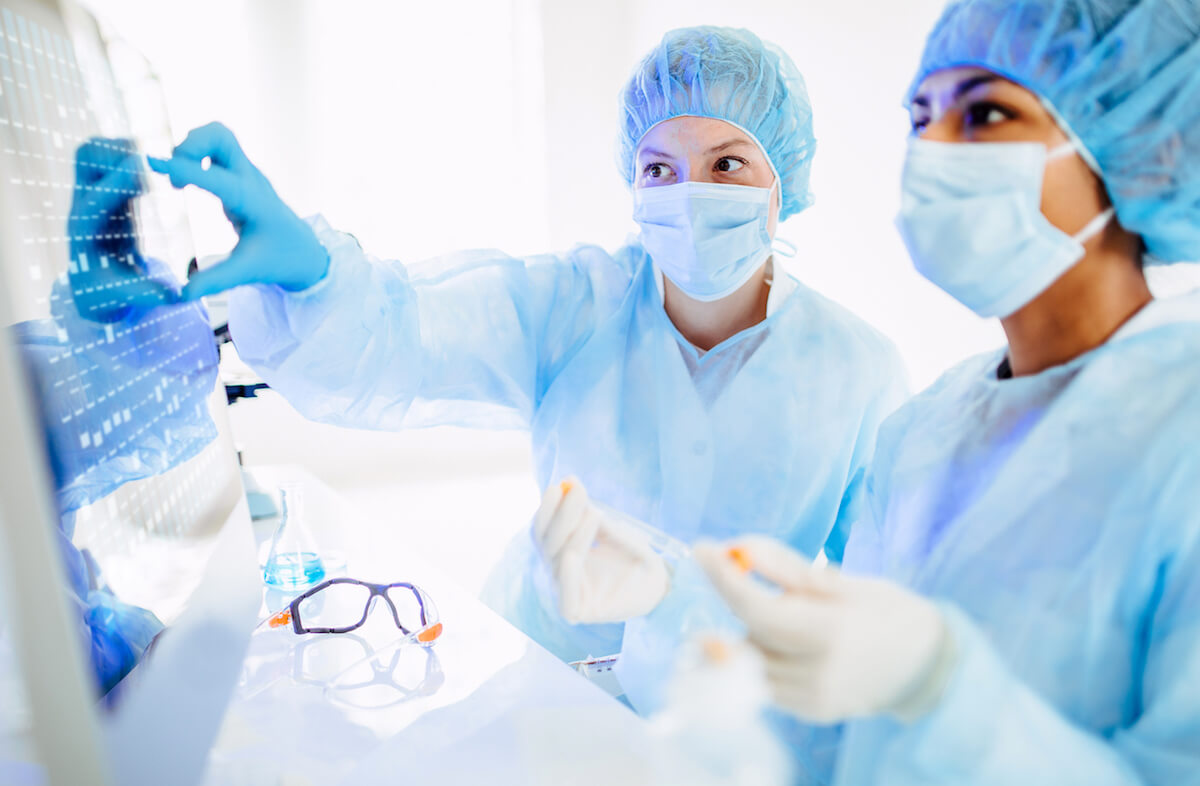Pharmacology and pharmacy may sound like similar terms, but in reality, they’re two very distinct areas of drug development and distribution. Understanding these differences can help you determine which degree and career path you should pursue. Here’s a breakdown of pharmacology vs. pharmacy and what you can expect in your studies of each.
What is Pharmacology?
Pharmacology is the study of how drugs function within the human body to help fight disease and the discovery and testing of new drugs for that purpose. It is one critical element of the drug development process. This multidisciplinary, research-heavy field combines medicinal chemistry, drug delivery, and biomedical research. Pharmacologists may study existing drugs and/or those still being evaluated for safety and efficacy, depending on their field of research.
Advance Your Career with a Master’s in Pharmacology
Learn how to transform your career in an industry that’s transforming the world.
Successful pharmacology professionals must have a foundation in biology, chemistry, molecular biology, and drug evaluation. They should also understand disease and drug mechanisms, drug targets, and new methods and technologies related to drug discovery and disease diagnosis.
Pharmacology Career Paths
“There are so many jobs that a pharmacologist could do,” says Raymond Booth, a professor of pharmaceutical sciences and chemistry at Northeastern’s School of Pharmacy.
The majority of pharmacology students go on to become bench scientists at biotechnology and pharmaceutical companies. These scientists are responsible for collecting data, testing compounds for safety and efficacy, and running experiments, among other laboratory tasks.
Pharmacologists can also pursue careers outside the lab as professors and researchers at universities or as a pharmaceutical company executive, where their knowledge of the drug development process can guide business decisions.
Bench scientists have an average annual salary of $80,974, and pharmacology jobs in other areas tend to offer high salaries, as well. Securing one of these jobs, however, can be a challenge.
“There are fewer jobs available, and they’re very competitive,” Booth says.
Students studying in Boston and Cambridge—two cities that host a large concentration of pharmaceutical and biotechnology companies—have a distinct edge over peers who have earned their degrees elsewhere.
“Any ‘in’ you have helps,” Booth says. “Being able to physically walk into a pharmaceutical or biotech company in Cambridge or Boston—that’s a huge advantage.”
What is Pharmacy?
Those who study pharmacy typically do so in order to become pharmacists, who prepare and dispense medication, monitor its use, and collaborate with other healthcare providers to treat patients. In addition to completing a doctorate in pharmacy (PharmD), students must also complete 1,500 training hours and pass the North American Pharmacist Licensure Exam.
Pharmacists have a deep understanding of medications and their effects on the human body, disease management, and immunology. They also study internal medicine, acute and ambulatory care, and other areas of healthcare.
Pharmacy Career Paths
Pharmacy students typically pursue jobs in drugstores, hospitals, clinics, and other traditional pharmacy settings. In these roles, pharmacists interface with patients, healthcare providers, and sometimes insurance companies to accurately distribute medication.
“Pharmacy implies that you’re going to be doing a certain, well-defined job,” Booth says. In fact, the majority of Northeastern’s pharmacy students—about 90 percent, according to Booth—pursue jobs in pharmacies.
These jobs have a median annual salary of $128,090. Because the Boston area is home to multiple schools of pharmacy whose students complete their training hours in the area, high-paying jobs are more readily available in other parts of the U.S.
The remaining 10 percent enter alternative career paths within the pharmacy industry. Some become regulatory affairs specialists at pharmaceutical or biotech companies and help prepare materials for approval processes around the world. Others work in sales and explain drug compositions and benefits to hospitals and insurers.
“A pharmacist is in the best position to explain a drug,” Booth says. “They can tell you why you should give that drug to a patient, or why you should pay for this drug versus that drug.”
Finally, some pharmacy professionals open specialty compounding facilities for non-standard drugs, many of which are formulated according to individual patients’ specific needs.
Advancing Your Pharma Career with Northeastern
Northeastern offers both a master’s degree and PhD in pharmacology. In both of these programs, students build their knowledge of drug action and discovery through coursework, seminars, conferences, and internship experiences.
The university’s PharmD program, meanwhile, connects students with more than 120 affiliated hospitals, clinics, community pharmacies, private businesses, and government agencies at which they can complete co-ops and training hours.
Whether you choose to study pharmacology or pharmacy, Northeastern offers a wide range of experience-based learning opportunities that can expand your education. Students in both programs can take advantage of Northeastern’s extensive research opportunities, co-ops, experiential network projects, and connections with faculty members who have real-world experience in their respective industries.
“Often, other schools don’t offer the immersive experience that we have at Northeastern,” Booth says. “The students at Northeastern get up and go to work, just like everybody else in Boston. People perform at a very high level here.”
To learn more about Northeastern’s pharmacy, pharmacology, and related pharmaceutical science degrees, explore the programs here.






Related Articles
PhD vs. Master’s in Biomedical Science: What’s the Difference?
10 Top Careers in Biomedical Science
What is Medicinal Chemistry?